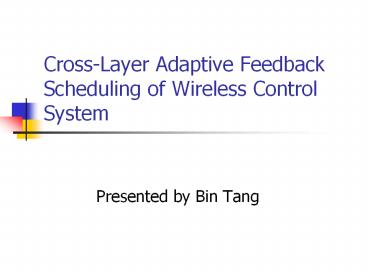Cross-Layer Adaptive Feedback Scheduling of Wireless Control System - PowerPoint PPT Presentation
1 / 24
Title:
Cross-Layer Adaptive Feedback Scheduling of Wireless Control System
Description:
Title: Cross-Layer Adaptive Feedback Scheduling of Wireless Control System Author: Computer Science Dept Last modified by: Computer Science Dept Created Date – PowerPoint PPT presentation
Number of Views:122
Avg rating:3.0/5.0
Title: Cross-Layer Adaptive Feedback Scheduling of Wireless Control System
1
Cross-Layer Adaptive Feedback Scheduling of
Wireless Control System
- Presented by Bin Tang
2
Wireless Control Systems (WCSs)
- Spatially distributed nodes of sensors,
controllers, and/or actuators interconnected with
wireless links - Advantages
- Flexible installation and maintenance, mobile
operation - Hazardous and inaccessible environment
- Cheaper cost
- Disadvantages
- Path loss, multi-path fading, interference, etc
- Delay, packet losses, jitters get more pronounced
3
WCS System Model
- Independent control loop
- Smart sensor (S)
- Smart actuator (A)
- Controller (C)
- Physical process (P)
- IEEE801.11b
- Variable channel capacity
- Control performance is decided by Deadline Miss
Ratio (DMR)
4
Deadline Miss Ratio (DMR)
- Deadline is equal to the sampling period
- Two cases for DMR
- Sample data/control command is lost through
wireless medium (bit error, interference, varying
strength) - Control command is received by actuator, later
than deadline
5
Cross-layer adaptive feedback scheduling (CLAFS)
scheme
- Information exchanging b/w application layer and
physical layer - Dynamically adjust sampling period w.r.t.
- transmission rate
- deadline miss ratio (DMR)
- Feedback scheduler
- uses PID algorithm with adaptive parameters
- Event-driven invocation algorithm
6
Sampling Period
- Sampling period of the control loop
- QoC and workload
- Delay and DMR
- Adjust sampling period based on transmission rate
and DMR
7
Analysis of DMR over WLAN
- DMR at appropriate non-zero desired
- Smaller sample period, larger DMR
- Larger sample period, poorer Quality of Control
8
PID (Proportional-Integral-Derivative) control
algorithm
9
feedback scheduling
- Sampling period at jth invocation instant of the
feedback scheduler - h(j) minh(j-1)?h(j), hmax
- hmax maximum allowable sampling period
- ?h(j)Ke(j)
- e(j)?(j)-?r actual and setpoint DMR
- K proportional coefficient
10
Proportional Coefficient K
- K0 from simulation
- ??, ??- parameter
11
Optimal Quality of Control (hr, ?r)
12
(No Transcript)
13
Event-triggered invocation
- Time-triggered not suitable for wireless
- A
- Execution-request event iff ?(j)-?rd
14
Performance Evaluation
- Matlab with TrueTime toolbox
- Two scenarios
- Scenario I Controller and process close to each
other 11Mbps no interfering - Scenario I Increased distance 5.5 Mbps
interfering signal
15
(No Transcript)
16
(No Transcript)
17
Wireless Sensor/Actuator Network Design for
Mobile Control Applications
18
Semi-Automated Architecture
Automated Architecture
19
Experimental Analysis of Link Quality
20
Dealing with Packet Loss on Actuator
- Idea when sensor data lost, actuator still
produce control command - Prediction from prev commands
- û(k) estimate of k-th control command
21
(No Transcript)
22
- Inverted pendulum system
- PID control algorithm
r(k) desired system output y(k) measured
system output
Integral of absolute error (IAE)
23
(No Transcript)
24
Random Thoughts
- Control Side
- How to find the optimal operating point (hr, ?r)?
- So far reactive, not proactive
- Automated or semi-automated?
- Wireless Network Side
- Can MAC layers and routing algorithms play a more
active in WCS? - Sensors/actuators/controllers coordination is not
considered - Data sensed by sensor is solely for the purpose
of control - Control application and other applications
together































